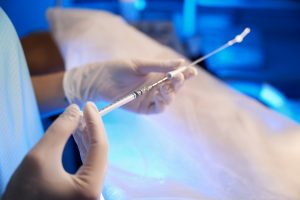Infertility due to Polycystic Ovary Syndrome (PCOS) is considered the most common form of infertility currently. But what exactly is this syndrome all about and how can you treat the infertility it causes naturally?
Polycystic Ovary Syndrome – what is it?
Polycystic ovary syndrome, sometimes known as polycystic ovarian disease, is an endocrinopathy that leads to menstrual and metabolic disturbances, infertility, increased androgen secretion, and affects the way the ovaries function. It is a metabolic condition associated with the induction of insulin in the blood as well as sugar intolerance.
What are the signs and symptoms?
Common signs and symptoms of PCOS are failure to ovulate, hair growth on the skin (hirsutism), menstrual irregularities, obesity and acne. Severe conditions show all the signs and symptoms, while milder conditions do not show all and to the same degree.
What causes PCOS infertility?
Infertility is usually due to the lack of ovulation as a result of excessive production of male hormones – androgens (testosterone) and insufficient production of progesterone and estrogen by the ovary. Due to the small amount of follicle-stimulating hormone (FSH), androgens cannot be converted into estrogens, and the follicles are unable to mature.
How to treat PCOS infertility with natural means?
Research has revealed that most ovulatory infertility conditions can be avoided with changes in diet and general lifestyle. So this is a good place to start. There are several key factors that may play a role in PCOS infertility. Determining what is effective in your case may determine the first type of treatment.
→ Management of insulin in the blood
It has been observed that insulin resistance results in excessive production of androgens by the ovaries. Insulin resistance goes hand in hand with weight problems, especially around the waist (deep, abdominal fat = fat around the internal organs). On the other hand, insulin resistance can also be found among those who are not really overweight. If you are overweight and have PCOS infertility it is wise to lose fat as well as restore insulin resistance. Insulin resistance indicates that the cells do not respond to insulin every time it hits with a brand new batch of blood sugar. It is usually due to the depletion involving the insulin receptor sites from the tissues from a diet high in processed and easy carbohydrates. This leads to excess glucose inside the blood vessels and not enough inside the cells. As a result it leads to exhaustion and also lethargy and a greater chance of microbial infections (due to too much glucose outside the tissues) and also diabetic problems.
→ Manipulation of testosterone & promotion of ovulation and menstruation
Unnecessary androgens (testosterone) come from too much luteinizing hormone (LH) being made by your body more than FSH (follicle stimulating hormone). This then results in immature eggs that by no means reach the point of ovulation, but form small growths within the ovaries. One type of estrogen can be converted to testosterone in fat cells, another reason to make sure you lose weight if it's high.
Stabilizing your body's hormones and letting your body produce a sufficient volume of hormones in order to ovulate and maintain pregnancy is the key and end result of all PCOS infertility treatment approaches.
What to do;
# 1. Avoid caffeine, alcohol, soft drinks, sweets, juices containing glucose, refined carbohydrates (white breads, cookies, chocolates, lollies, etc.).
# 2. Eat moderate healthy protein-rich meals about every three hours so you can balance your own blood sugar levels.
# 3. Start regular exercise – aerobic as well as strength training
# 4. Include cinnamon in your foods. It has been found to enhance insulin sensitivity in women with PCOS. Porridge is a great way to get some cinnamon right into your daily diet along with apples baked in the oven with some cinnamon and crushed nuts.
# 5. Completely limit your intake of dairy products other than animal products (even when these may be natural and organic). This is due to the significant amount of hormones, inorganic sprays and herbicides that are recognized endocrine disruptors. Vegetarian eating plans and high fiber diets have generally been found to be extremely valuable in cases where the hormonal balance is out of whack, including PCOS. Even if the animal has not received artificial hormones, it has produced its own hormones that are reflected in dairy products or various meats.
# 6. Excessive androgen production has been shown to respond to licorice ingestion, so add plenty of licorice to your diet, look for them at a retail store.
# 7. Eat much more: beans, basil, cayenne pepper, chestnut, chives, eggplant, garlic cloves, ginger herb, pumpkin, leek, nutmeg, pepper, wheat, rosemary, mint and turmeric extract.
# 8. Minimize stress using yoga, meditation, breathing exercises, 8 hours of uninterrupted sleep, exercise routines, lavender and linden tea.
# 9. See an herbalist or homeopath as many herbal remedies have been shown to successfully treat PCOS.
# 10. Take a high-quality multivitamin pill as well as fish oil (make sure it's tested for mercury and fortified with vitamin E).

































